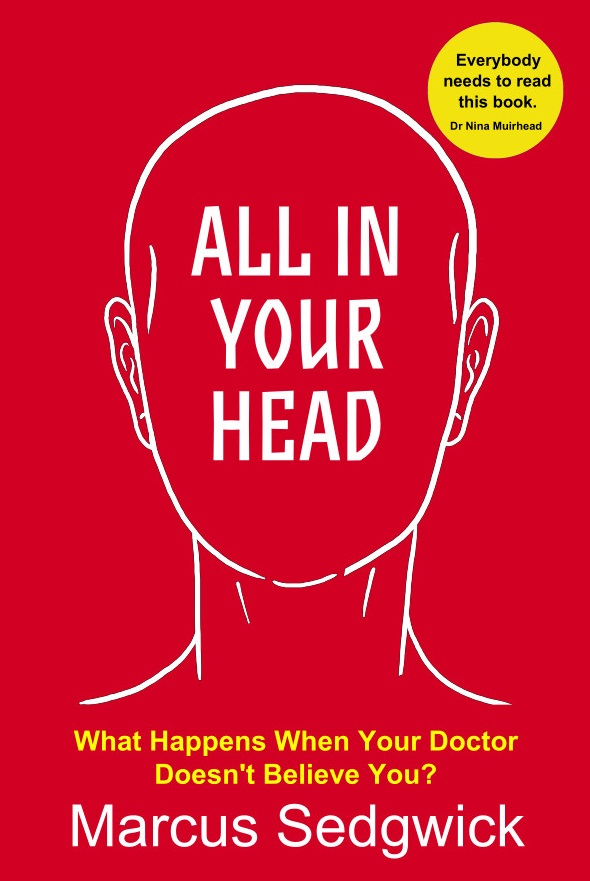Marcus Sedgwick was an award-winning British writer who passed away in November 2022 in France. Writing in YA, Science Fiction, and Non-Fiction genres (amongst others), he burst onto the scene with Floodland (which won the 2001 Branford Boase Award) and also achieved acclaim with The Foreshadowing, She Is Not Invisible, and Midwinterblood, which won the Michael L. Printz Award in 2014.
Marcus wrote extensively about his long and debilitating battle with chronic fatigue illness, and his final book – All In Your Head: What Happens When Your Doctor Doesn’t Believe You? – was published just a few weeks before his untimely death. (Below, Marcus explains why he wrote the book.) Married and divorced three times, Marcus is survived by his daughter, Alice.
Preface
I had written three, maybe four drafts of this book, when seemingly overnight, the world was turned upside down. It was forced to stay at home, locked down, locked in, for fear of some largely unknown and terrifying illness. An unseen beast was stalking our streets, workplaces and playgrounds, and as the world – some of it sooner, some of it later – started to realise that this was not a matter that could be easily predicted, or ignored, or simply brazened out, it was forced into the state we came to call confinement. But this monumental, global cataclysm was something strangely familiar to great numbers of people. In fact, for some millions of people around the world, the state of being largely or entirely confined at home, and the state of suffering from a poorly understood disease was, already, their daily existence.
I am one of those people.
I became one of those people seven years ago, with the arrival in my life of an unwanted stranger, though this stranger was someone who was also very familiar. It was me; to be precise, a sick version of me. As I write, I’ve only been ill for seven years, but that seven years has been enough to establish that the cause of my illness cannot be established. I remained undiagnosed. For those who might say that comparison with the pandemic should not be made, since this undiagnosed illness of mine is not life-threatening, I would just ask you to read on, because there are one or two things to say about that. And though, at first, they might appear to be very different sicknesses, there is a relationship between them of which many people are only just becoming aware. Just like confinement, this is an illness that locks you in with yourself; it forces you to confront your deepest, truest self; there are no more distractions of work, or friends, or hobbies. Whatever it was you used to do that defined you may have been taken from you. There is just you, and four walls, something that most of us never had to contemplate. Until the cataclysm came along and changed all that.
But more plainly: in March of 2020, as the pandemic really took hold, I wrote to a number of national newspapers in the UK and the US, offering them a story I felt they might want to run. In the story, I predicted the arrival of the thing we now call Long Covid, though I didn’t use that phrase, for it hadn’t been coined yet. This wasn’t such an extraordinary piece of fortune-telling – there were dozens of us crying the same warning, dozens of people like me, for whom an acute, viral infection had been the trigger for something much more permanent. From our perspective, it was easy to see that the relatively small number of people with a lifelong illness would soon become a huge number. This was the story I offered to the papers – none of them were interested. As Cassandra of Troy found to her cost, you cannot tell people what to be interested in, until it is too late.
But this is what the pandemic has already started to do. It has turned a minority health issue into a global concern. Not the matter of the acute illness, as frightening as that might be, but the long-form sickness that can follow – for many people who contract the Coronavirus, for those who do not make a total recovery, the world will never be the same again. What was a story that affected perhaps less than 1% of the world population is becoming a story that everyone will be familiar with. It will happen to someone you know; it will happen to someone you work with, someone in your family, someone you love. It might even happen to you.
This book isn’t a story, not exactly. Neither is (my) illness a story, but through writing this book and in being ill, I was brought face to face with the role that stories play in our lives; the way we each tell ‘our story’, and what happens when that story breaks down. When it no longer works. When meaning can no longer be applied. Something that has now also been replicated on a worldwide scale, as we have seen the near shattering of a myth that I would suggest most people in the world still hold to be true, still need to be true: that we are in charge of the world, and not the other way around.
This book is about the stories we tell, which ones we want to hear, and which we don’t. It’s about seven years in a life, in which I tried to work out what was wrong with me when no doctor could; the effect that had on my personal narrative; and more than anything else, the damage done to you when your doctor does not believe you. This, too, might happen to you.

